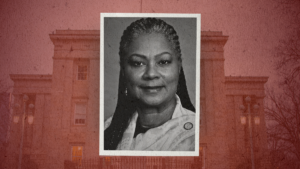Source: The Associated Press, NC Newsline
North Carolina abortion providers have filed a lawsuit in federal court to challenge several provisions of the state’s new abortion law. Planned Parenthood South Atlantic and Dr. Beverly Gray, a Duke University OBGYN, are asking a judge to block the implementation of several provisions.
The law in question would ban abortions after 12 weeks of pregnancy, but health care providers have raised concerns about the impact the law will have on their ability to provide care to patients in need.
Hannah Schoenbaum, reporter for The Associated Press (AP), identified a number of key provisions that providers are seeking to remedy in court. Advocates have warned that several of these provisions make the abortion ban far more extreme than its Republican supporters would lead you to believe. According to the AP, some of those provisions include:
A provision that appears to prevent providers from providing medication abortion after 10 weeks of pregnancy, despite another provision of S.B. 20 that explicitly states medication abortion is lawful through the first 12 weeks of pregnancy;
A mandate that survivors of sexual assault obtain abortions in a hospital after 12 weeks of pregnancy under exceptions for rape or incest, despite the overwhelming safety of abortion care and well-trained medical professionals who can effectively provide care in a clinic setting as they have done for decades;
A provision requiring certain information be provided to the patient 72 hours before the abortion with no exception for medical emergencies, despite other sections of S.B. 20 which outline a medical emergency exception to the 72-hour mandatory delay; and
A prohibition on advising how a person can access an abortion after 12 weeks of pregnancy, possibly preventing health care providers from helping patients access lawful care out of state in violation of the First Amendment of the Constitution.
Following the fall of Roe, North Carolina has served as a relatively safe haven for those seeking abortion care in the South as abortion bans have taken hold in neighboring states. Advocates are concerned about the impact this law and these harmful provisions will have on North Carolinians as well as abortion-seekers across the entire South.
Planned Parenthood South Atlantic CEO Jenny Black warned that “many of these provisions are going to constrain an already very constrained abortion ecosystem in this state.”
As a reminder, this nearly 47-page law was quickly passed by the Republican legislature with very little input from the public. And its passage was made possible by a number of members of the General Assembly from across the state who campaigned and won their elections last year on a promise to protect reproductive freedom.
In an effort to address these multiple issues, state Senate Republicans on Monday night passed changes to the law just two days before the scheduled federal court hearing. Monday night’s vote was held to approve last-minute changes added last week in an effort to address some of the concerns raised in the lawsuit.
While working to pass these last-minute changes, Republicans also voted to table without debate 12 Democratic amendments that addressed a variety of problems with the bill, NC Newsline reported.
State Sen. Natalie Murdock (D-Durham), said the law will force people to carry pregnancies and give birth against their will. She also highlighted our state’s outrageously high Black maternal mortality rate – Black women die at approximately three times the rate of white women from causes related to pregnancy and childbirth.
“My ancestors were enslaved in Orange County in North Carolina,” Murdock said. “Black women have been fighting for control of their bodies for centuries. Black mothers and babies are dying.”
Murdock’s amendment would have codified the U.S. Supreme Court decisions Roe v. Wade and Planned Parenthood v. Casey.
Democrats offered amendments that would:
- Establish the right to contraception.
- Prohibit tracking of emergency contraception sales.
- Affirm that women can seek abortions in other states and that people can help them obtain out-of-state abortions.
- Make it illegal to block people from entering facilities that perform abortions, to harass or threaten people seeking abortions, or to publish their personal information.
- Allow lawsuits against people who block facilities that perform abortions, harass or threaten people seeking abortions, or publish their personal information.
- Establish that it is legal to drive a woman to a facility offering abortions.
- Prohibit use of technology to track people within a one-mile radius of a facility offering abortions.
- Prohibit internet service providers from giving information on search histories, browsing histories, and nonpublic communications about people’s decision to seek abortions to third parties or to law enforcement agencies.
- Prevent fathers from suing women who have abortions and the people who help them obtain abortions.
- Require crisis pregnancy centers to seek state certification. Require pregnancy centers that receive state money to provide medically accurate information about abortion.
- Forgo the 72-hour waiting period to avert death for women with psychological or emotional conditions. The law does not require a waiting period where delay would risk substantial or irreversible physical impairment.
The House approved the changes on Tuesday afternoon and the bill will now be sent to Gov. Roy Cooper.
Republicans have resorted to trickery and last-minute changes in an effort to make sure their unconstitutional bill can become state law.
State Attorney General Josh Stein, who is running for governor as a Democrat, is listed as a defendant in the lawsuit. He has made it clear that his office won’t be defending portions of the law because they are unconstitutional.





